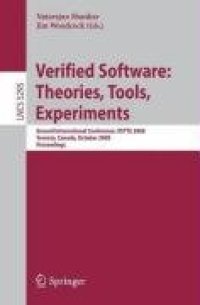
Ebook: Verified Software: Theories, Tools, Experiments: First IFIP TC 2/WG 2.3 Conference, VSTTE 2005, Zurich, Switzerland, October 10-13, 2005, Revised Selected Papers and Discussions
- Tags: Programming Techniques, Software Engineering, Programming Languages Compilers Interpreters, Operating Systems, Logics and Meanings of Programs, Artificial Intelligence (incl. Robotics)
- Series: Lecture Notes in Computer Science 5295
- Year: 2008
- Publisher: Springer-Verlag Berlin Heidelberg
- Edition: 1
- Language: English
- pdf
This state-of-the-art survey is an outcome of the first IFIP TC 2/WG 2.3 working conference on Verified Software: Theories, Tools, Experiments, VSTTE 2005, held in Zurich, Switzerland, in October 2005. This was a historic event gathering many top international experts on systematic methods for specifying, building and verifying high-quality software.
The book includes 32 revised full papers and 27 revised position papers, preceded by a general introduction to the area, which also presents the vision of a grand challenge project: the "verifying compiler". Most contributions are followed by a transcription of the vivid discussion that ensued between the author and the audience. The papers have been organized in topical sections on verification tools, guaranteeing correctness, software engineering aspects, verifying object-oriented programming, programming language and methodology aspects, components, static analysis, design, analysis and tools, as well as formal techniques.
This volume contains the proceedings of the second working conference on Verified Software: Theories, Tools, and Experiments, VSTTE 2008, held in Toronto, Canada, in October 2008. The 16 papers presented together with 4 invited talks were carefully revised and selected for inclusion in the book. This second conference formally inaugurates the Verified Software Initiative (VSI), a fifteen-year, co-operative, international project directed at the scientific challenges of large-scale software verification. The scope of the cooperative effort includes the sharing and interoperability of tools, the alignment of theory and practice, the identification of challenge problems, the construction of benchmark suites, and the execution of large-scale experiments.